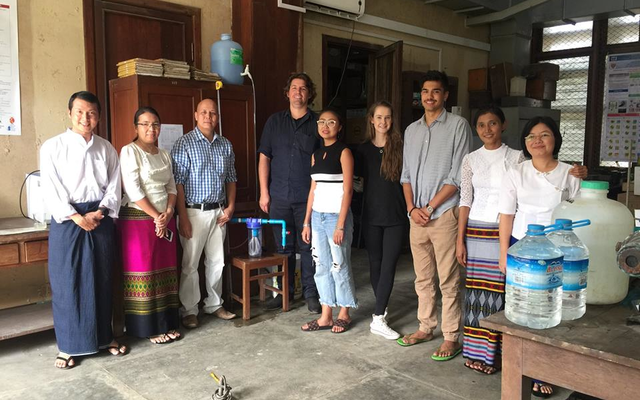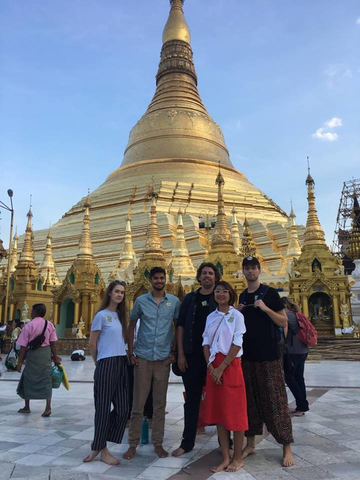
New Colombo Plan funds a project to develop water and wastewater teaching materials in Yangon Technological University.
“Our expedition to Myanmar was so valuable,” says third year Chemical Engineering student Larissa Reihberg-Laaksonen. “The warm souls of everyone we met and the work we undertook was such a positive experience, and it was incredible to experience first-hand in another country something so directly related to my degree.”

Reihberg-Laaksonen was one of four students from the Schools of Chemical, Civil and Environmental Engineering who were funded by the New Colombo Plan to visit Yangon Technological University (YTU) in Myanmar as part of a project to develop water and wastewater teaching materials. The visit took place in January 2018 and they were supervised and significantly helped by Dr Amos Branch on the project which was initiated and set in motion last year by UNSW water filtration expert Pierre Le Clech.
An Associate Professor in the School of Chemical Engineering, Le Clech says his main research focus has always been developing technologies for water and wastewater treatment, but in recent years he has refocused his ideas to better accommodate the rapidly-growing discipline of humanitarian engineering and what he calls ‘appropriate technologies’ suitable for developing countries and remote areas.
“Appropriate technology means taking into account the socioeconomic environment in which the technologies will be implemented and used, in order to fine-tune their selection, design, operation and maintenance for a given environment,” he says.
“The main aim of this project was to help local students and academics develop appropriate teaching tools and tutorials as well as develop in-house, cheaply-built and locally-sourced demonstration systems to illustrate the principles behind water and wastewater treatment.”
Reihberg-Laaksonen says that prior to travelling she and her fellow UNSW students each researched a different type of water treatment process including sand filtration, activated carbon absorption and membrane separation. Her job was to learn all about membrane processes and she worked hard learning the basic science behind them and how to build a demonstration rig so she could pass this knowledge onto the students and academics when she got to YTU.
“When we arrived, we were able to explain the different types of water treatment systems and through the construction of rigs, demonstrate how each system worked and the basic operating conditions and governing equations behind them,” she says.
“Importantly, the majority of the materials we used were sourced from hardware shops in Yangon so the university staff and students can easily replicate these experiments in the future,” Reihberg-Laaksonen continues.
As engineers, we are in a unique position to apply our technical skills in places they are needed most.
Niall Earle, third year UNSW Chemical Engineering student
Third year Chemical Engineering student, Niall Earle, says he was inspired to apply for a place on the project because his father runs a human rights NGO and he is aware of the multitude of environmental and humanitarian problems across the Asia-pacific region. “As engineers, we are in a unique position to apply our technical skills in places they are needed most and unfortunately, water quality in developing countries is a pertinent issue which is rooted in complex political, economic, social and ecological factors,” he says.
“Experiences like this are bound to throw up unique insight and nuance along the way and developing a YTU foreigners guide was an unexpected achievement. It felt entirely natural to document our experiences including arrival tips, language tips, locations and local etiquette so we can help the next wave of UNSW students when they visit Myanmar,” he says.
Le Clech says UNSW’s relationship with YTU goes back to 2013 shortly after it was permitted to resume enrolling Bachelor of Engineering students. “Prior to that, YTU had been closed for almost 20 years and was essentially a blank slate with empty labs and no teaching materials,” he says.
“This provided the inspiration for UNSW to start donating equipment, expertise and course material to help rebuild their engineering degree programs and since then the partnership has flourished.”
Watch a video from their trip here.
Written by: Penny Jones
